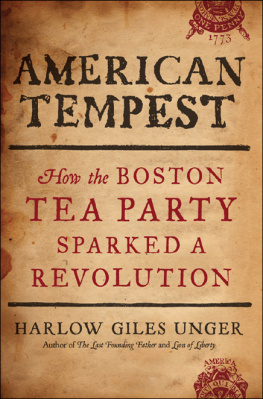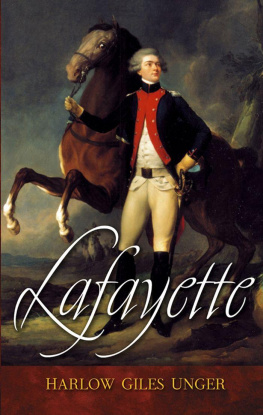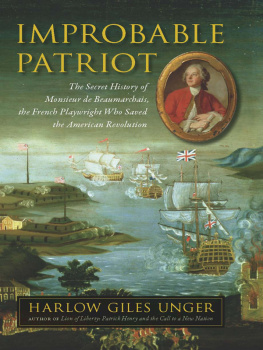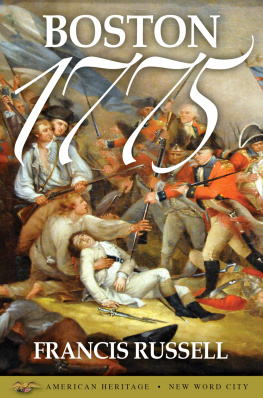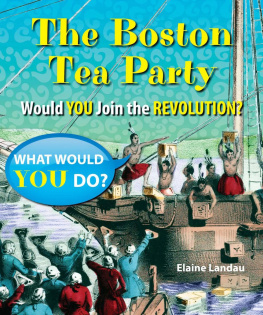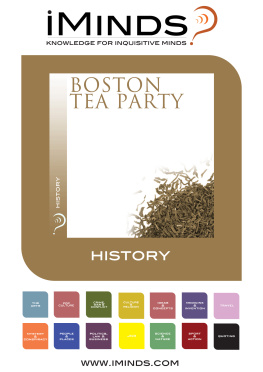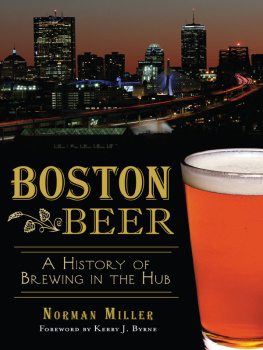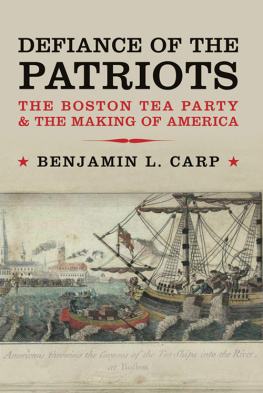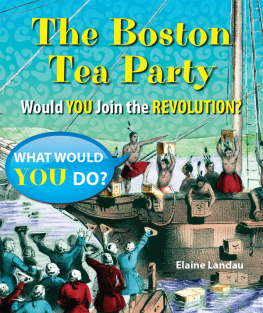American Tempest
American
Tempest

H OW THE B OSTON T EA P ARTY
S PARKED A R EVOLUTION

HARLOW GILES UNGER

DA CAPO PRESS
A Member of the Perseus Books Group
Copyright 2011 by Harlow Giles Unger
All rights reserved. No part of this publication may be reproduced, stored in a retrieval system, or transmitted, in any form or by any means, electronic, mechanical, photocopying, recording, or otherwise, without the prior written permission of the publisher. For information, address Da Capo Press, 11 Cambridge Center, Cambridge, MA 02142.
Designed by Trish Wilkinson
Set in 11.5 point Adobe Garamond Pro
Library of Congress Cataloging-in-Publication Data
Unger, Harlow G., 1931
American tempest : how the Boston Tea Party sparked a revolution / Harlow Giles Unger.1st Da Capo Press ed.
p. cm.
Includes bibliographical references and index.
ISBN 978-0-306-81962-9 (hardcover : alk. paper) 1. Boston Tea Party, 1773. 2. United StatesHistoryRevolution, 17751783Causes. I. Title.
E215.7.U64 2011
First Da Capo Press edition 2011
Published by Da Capo Press
A Member of the Perseus Books Group
www.dacapopress.com
Da Capo Press books are available at special discounts for bulk purchases in the U.S. by corporations, institutions, and other organizations. For more information, please contact the Special Markets Department at the Perseus Books Group, 2300 Chestnut Street, Suite 200, Philadelphia, PA 19103, or call (800) 810-4145, ext. 5000, or e-mail .
10 9 8 7 6 5 4 3 2 1
To Bob Pigeon and Lissa Warren
There is nothing so easy as to persuade people that they are badly governed.
THOMAS HUTCHINSON,
GOVERNOR OF MASSACHUSETTS
Contents
Appendix A: The Declaration of Independence
and Its Signatories
Maps
Illustrations
My deepest thanks to the wonderful staff at my publisher, Da Capo Press of the Perseus Books Group. All work incredibly hard behind the scenes and seldom receive the public acknowledgment they deserve for the beautiful books they produce and market. I owe a great debt of thanks to Publisher John Radziewicz, who has championed the publication of this and other books on American history. Special thanks, too, to Lissa Warren, the brilliant director of publicity, whose tireless efforts I believe do more to promote the study of American history than many schools and colleges. Among other essential contributors to this and other Da Capo books are Kevin Hanover, director of marketing, and the wonderful sales force of the Perseus Books Group; marketing executive Sean Maher, editor Jonathan Crowe; the incredibly skilledand patientCisca L. Schreefel, associate director of editorial services and project editor for this book; copy editor Josephine Mariea; proofreader Anna Kaltenbach; and indexer Robie Grant.
Finally, my most sincere thanks to my wonderful editor Robert Pigeon, executive editor at Da Capo Press, for the time, energy, passion, and skills he contributed to this book, and to my literary agent Edward W. Knappman of New England Publishing Associates, for his enduring faith in my work.
Authors Note: Spellings and grammar in the eighteenth-century letters and manuscripts cited in this book have, where appropriate, been modernized to clarify syntax without altering the intent of the original authors. The original spellings may be found in the works cited in the endnotes and bibliography.
B ostonians had just stepped out of their homes to go to work when they spotted the notices on fence posts and trees: Friends! Brethren! Countrymen! That worst of plagues, the detestable tea is now arrived.... The hour of destruction or manly opposition to the machinations of tyranny stare you in the face.
It was Monday morning at nine, November 29, 1773, when the first church bell tolled, then a second, and anotheruntil every church tower in the city rocked in the fearful crescendo. All but paralyzed with fear by the din, neighbors glanced at each other, then began trotting down the narrow alleys to the waterfront. Shopkeepers who had just opened for business shuttered their doors and joined the flow of peoplehundreds, at first, then thousands, from all directions swarming into the square in front of Faneuil Hall. All tried forcing their way inrich, poor... merchants, craftsmen, farmers, shipfitters, seamen, laborers... beggars, thieves, thugs... men and boys... clubs, rifles, pistols, and a variety of missiles in hand, ready to shatter windows of the capitol or fire at the gods in heaven. They called for the blood of those they hatedBritish officials, those who supported British rule, those who deprived them of what they perceived as liberty. They called for the overthrow of a government that had fostered their prosperity for generations and protected them from enemy attacks by hostile Indians, French troops, and Spanish conquistadores for a century and a half.
Massachusetts Chief Justice Peter Oliver puzzled over the tempest swirling around him: For a colony which had been nursed in its infancy with the most tender care and attention, which has been indulged with every gratification that the most forward child could wish for... to plunge into an unnatural rebellion... must strike some with a degree of astonishment. By adverting to the historic page, we shall find no previous revolt... but what originated from severe oppressions.
The cause of the ruckus was indeed astonishing: a three-penny-per-pound tax on British tea, which was nothing more than a social beverage largely consumed by idle women as a sign of politeness and hospitality... a mark of civility and welcome. But men seldom drank it, and it ranked below ale or rum among the beverages that Americans consumed most. Indeed, only about one-third of the population drank as many as two cups a day, and the tax had no effect on consumption. Eminently affordable by almost every American, tea had first appeared in America as an all-purpose elixir for headaches, giddiness, and heaviness... colds, drop-sies, and scurviesand it expelleth infection... prevents and cures agues, surfeits and fevers.
Although the largest, wealthiest merchant groups routinely paid whatever duties the government demanded and absorbed the tiny extra costs, second-tier and third-tier merchants on the edge of failure evaded duties and tried to gain a competitive edge by buying low-cost, smuggled Dutch tea that they could sell at prices well below those of dutied English teas. The British government, however, badly needed to collect those duties. It had accumulated debts of more than 1 million in the French and Indian War in the north and west, and Parliament was determined to step up tax enforcement to force Americans to assume more of the costs of their own defense.
Bostons mid-level merchants objected and, as Massachusetts Royal Governor Thomas Hutchinson put it, From so small a spark, a great fire seems to have been kindled.

